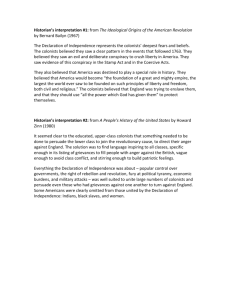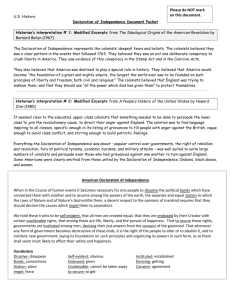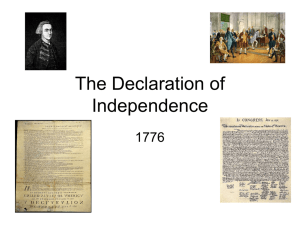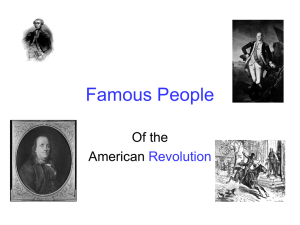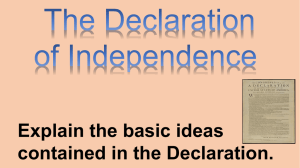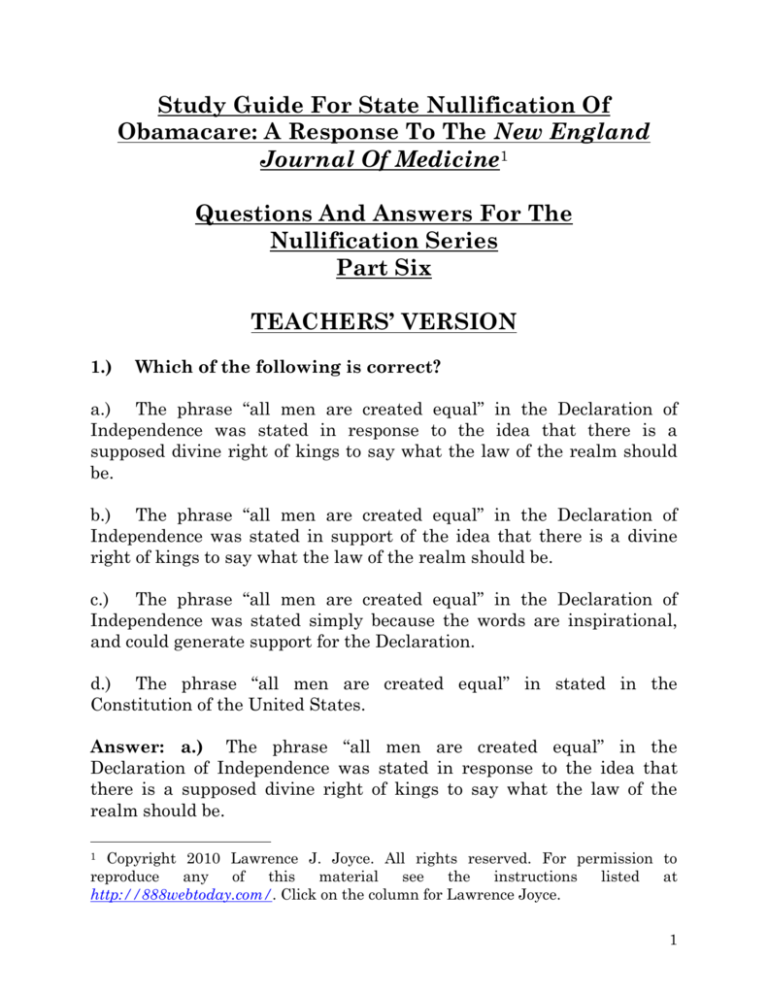
Study Guide For State Nullification Of
Obamacare: A Response To The New England
Journal Of Medicine1
Questions And Answers For The
Nullification Series
Part Six
TEACHERS’ VERSION
1.)
Which of the following is correct?
a.) The phrase “all men are created equal” in the Declaration of
Independence was stated in response to the idea that there is a
supposed divine right of kings to say what the law of the realm should
be.
b.) The phrase “all men are created equal” in the Declaration of
Independence was stated in support of the idea that there is a divine
right of kings to say what the law of the realm should be.
c.)
The phrase “all men are created equal” in the Declaration of
Independence was stated simply because the words are inspirational,
and could generate support for the Declaration.
d.) The phrase “all men are created equal” in stated in the
Constitution of the United States.
Answer: a.) The phrase “all men are created equal” in the
Declaration of Independence was stated in response to the idea that
there is a supposed divine right of kings to say what the law of the
realm should be.
Copyright 2010 Lawrence J. Joyce. All rights reserved. For permission to
reproduce
any
of
this
material
see
the
instructions
listed
at
http://888webtoday.com/. Click on the column for Lawrence Joyce.
1
1
See, Part Six, Section III.B.4, pp. 1-2.
2.)
Which of the following is correct?
a.)
The divine right of kings is based on the Bible.
b.) The Bible neither supports nor stands in opposition to a divine
right of Kings.
c.)
The divine right of kings is the basis of the statement in the
Declaration of Independence that “all men are created equal.”
d.) The divine right of kings squarely contradicts Biblical principles of
government.
Answer: d.) The divine right of kings squarely contradicts Biblical
principles of government.
See, Part Six, Section III.B.4, pp. 2-3.
3.)
Which of the following is correct?
a.) The Declaration of Independence states that the legitimate source
of government authority is the divine right of kings.
b.) The Declaration of Independence states that the legitimate source
of government authority is the Supreme Court.
c.)
The Declaration of Independence states that the legitimate source
of government authority is the consent of the governed.
d.) The Declaration of Independence does not mention the specific
source of government authority.
Answer: c.) The Declaration of Independence states that the
legitimate source of government authority is the consent of the
governed.
2
See, Part Six, Section III.B.4, pg. 3.
4.)
Which of the following is correct?
a.) The Declaration of Independence says that anytime a government
becomes destructive of the ends for which the people created it, the duty
of the people is to petition that government to correct itself until the
government listens to them.
b.) The Declaration of Independence says that anytime a government
becomes destructive of the ends for which the people created it, the
people can modify the government, but they have no right or authority
to abolish it.
c.)
The Declaration of Independence says that anytime a government
becomes destructive of the ends for which the people created it, the
divine right of Kings requires them to submit to that government.
d.) The Declaration of Independence says that anytime a government
becomes destructive of the ends for which the people created it, it is the
right and duty of the people to alter or abolish it.
Answer: d.) The Declaration of Independence says that anytime a
government becomes destructive of the ends for which the people
created it, it is the right and duty of the people to alter or abolish it.
See, Part Six, Section III.B.4, pg. 3.
5.)
Which of the following is correct?
a.) In the Declaration of Independence, the colonists stated a long list
of grievances against King George III, which they claimed were proof of
an intent by King George to rule the colonists under absolute
despotism, and which they claimed were the justification for their
throwing off the British government as their lawful government.
3
b.) In the Declaration of Independence, the colonists said they could
throw off the British government because it is the right of a free people
to do so.
c.)
In the Declaration of Independence, the colonists stated that the
principle of “No Taxation Without Representation” was the primary
reason why they were throwing off the British government.
d.) In the Declaration of Independence, the colonists said that they
were throwing off the British government because “We the People” had
voted to do so.
Answer: a.) In the Declaration of Independence, the colonists
stated a long list of grievances against King George III, which they
claimed were proof of an intent by King George to rule the colonists
under absolute despotism, and which they claimed were the
justification for their throwing off the British government as their
lawful government.
See, Part Six, Section III.B.4, pp. 3-5.
6.)
Which of the following is correct?
a.) In the Declaration of Independence, the colonists said that they
could no longer legislate among themselves because King George had
abolished their legislatures.
b.) In the Declaration of Independence, the colonists said that the
Legislative Powers are incapable of Annihilation, and that those powers
had returned to the People at large.
c.)
In the Declaration of Independence, the colonists said the
Legislative Powers are incapable of Annihilation, and that those powers
had returned to the British Parliament.
d.) In the Declaration of Independence, the colonists said that their
Legislative Powers had suffered Annihilation, and that therefore they
were free to declare themselves independent of British rule.
4
Answer: b.) In the Declaration of Independence, the colonists said
that the Legislative Powers are incapable of Annihilation, and that
those powers had returned to the People at large.
See, Part Six, Section III.B.4, pp. 4, 6.
7.)
Which of the following is correct?
a.) In adopting the Declaration of Independence, the colonists
performed the first exercise in self-government in America.
b.) In adopting the Declaration of Independence, the colonists
performed an exercise in self-government which was completely new
and different from their previous colonial experience.
c.)
In adopting the Declaration of Independence, the colonists
performed an exercise in self-government which was based upon their
earlier exercises in self-government.
d.) Considerable debate exists as to whether the colonists, in adopting
the Declaration of Independence, were being consistent with, or
contradicting, their previous forms of colonial government.
Answer: c.) In adopting the Declaration of Independence, the
colonists performed an exercise in self-government which was based
upon their earlier exercises in self-government.
See, Part Six, Section III.B.4, pg. 6.
8.)
Which of the following is correct?
a.) The colonists and King George III were each acting out their world
views.
b.) The colonists were acting out their world view, but King George
III was not acting out his world view of government.
5
c.)
The colonists were not acting out their world view, but King
George III was acting out his.
d.) The colonists and King George III were each acting without
respect to their world views.
Answer: a.) The colonists and King George III were each acting out
their world views.
See, Part Six, Section III.B.4, pp. 6-7.
9.)
Which of the following is correct?
a.) Revolutionary War pamphleteer Thomas Paine urged the colonists
to return to British rule on the grounds that the divine right of Kings is
based on the Bible.
b.) Revolutionary War pamphleteer Thomas Paine said that a
claimed right of having unlimited power over a people was impious, for
only God has such power.
c.)
Revolutionary War pamphleteer Thomas Paine urged the colonists
to overthrow British rule even though the divine right of Kings is based
on the Bible.
d.) Revolutionary War pamphleteer Thomas Paine said that the
question of whether there is a divine right of Kings is for God alone to
decide.
Answer: b.) Revolutionary War pamphleteer Thomas Paine said
that a claimed right of having unlimited power over a people was
impious, for only God has such power.
See, Part Six, Section III.B.4, pg. 7.
10.) Which of the following is correct?
6
a.) The colonists, like most people today, thought of Liberty as simply
being something which each person has a right to enjoy.
b.) The colonists, like most people today, thought of Liberty as being
both a right and something which one has a duty to secure.
c.)
The colonists, unlike most people today, thought of Liberty as
being both a right and something which one has a duty to secure.
d.) The colonists, unlike most people today, thought of Liberty as
simply being something which each person has a right to enjoy.
Answer: c.) The colonists, unlike most people today, thought of
Liberty as being both a right and something which one has a duty to
secure.
See, Part Six, Section III.B.4, pp. 7-8.
11.) Which of the following is correct?
a.) Christians should recognize that tyranny is not something for
which God creates government.
b.) Christians should recognize that because of the separation of
church and state, it is permissible to oppose tyranny, even though it is
one of the things for which God creates government.
c.)
Christians should recognize that because government is created
by God, even tyranny is something for which God creates government.
d.) Christians should recognize that the Bible gives no guidance on
whether tyranny is something for which God creates government.
Answer: a.) Christians should recognize that tyranny is not
something for which God creates government.
See, Part Six, Section III.B.4, pg. 8; see also, Romans 13:3-4.
7
12.) Which of the following is correct?
a.) Limited Nullification would challenge the legitimacy of
unconstitutional federal laws just as much as the colonists challenged
the legitimacy of King George III’s claim to a divine right of Kings.
b.) Limited Nullification would challenge the legitimacy of
unconstitutional federal laws to a greater extent than the colonists
challenged the legitimacy of King George III’s claim to a divine right of
Kings.
c.)
Limited Nullification would challenge the legitimacy of
unconstitutional federal laws to a lesser extent than the colonists
challenged the legitimacy of King George III’s claim to a divine right of
Kings.
d.) Limited Nullification would not challenge the legitimacy of
unconstitutional federal laws.
Answer: c.) Limited Nullification would challenge the legitimacy of
unconstitutional federal laws to a lesser extent than the colonists
challenged the legitimacy of King George III’s claim to a divine right of
Kings.
See, Part Six, Section III.B.4, pg. 8.
13.) True or False?
We as a people have remembered that under the Magna Carta, a
determination of whether the king had violated the Magna Carta, and
whether the barons would have the right to take up arms against the
king, would be determined by the barons themselves, and not by the
king or by the courts.
True
False
Answer: False.
8
See, Part Six, Section IV.A, pg. 9.
14.) True or False?
We as a people have remembered that the Mayflower Compact
broke with the past because it was based on the idea that, in order for
legitimate, lawful government to exist, the authority for such
government did not have to be granted by some earthly king, and could
arise instead from people pledging before God their commitment to each
other and to the government they were creating.
True
False
Answer: False.
See, Part Six, Section IV.A, pg. 9.
15.) True or False?
We as a people have remembered that the Fundamental Orders of
Connecticut broke with the past because it was based on the idea that,
in order for legitimate, lawful government to exist, the charter of
government did not even have to make reference to a “dread Sovereign”
lord or king, and that the authority for the government could arise
instead from people pledging before God their commitment to each
other and to the government they were creating.
True
False
Answer: False.
See, Part Six, Section IV.A, pg. 9.
16.) True or False?
We as a people have remembered that the Founding Fathers
recognized that it would be improper for the government itself to
determine whether a state would ratify the newly-proposed
9
Constitution, and that the authority to ratify it had to come directly
from the people themselves, through representatives chosen specifically
for the task of determining whether the Constitution would be ratified
or not.
True
False
Answer: False.
See, Part Six, Section IV.A, pg. 9.
17.) True or False?
The Bible makes it clear that it is not important to remember the
things of God, and all that God has done for His people.
Answer: False.
See, Part Six, Section IV.B., pp. 9-10.
18.) Which of the following is correct?
a.) In terms of basic needs and the chance of survival, the Pilgrims
were no worse off in America than they would have been over in
Europe, and so they decided to stay in America.
b.) In terms of basic needs and the chance of survival, the Pilgrims
were far worse off in America than they would have been over in
Europe, but they stayed in America anyway so that they could enjoy
religious freedom and self-government for themselves and for their
children.
c.)
In terms of basic needs and the chance of survival, the Pilgrims
were far worse off in America than they would have been over in
Europe, but they had to stay in America because they were stranded,
and had no way back.
10
d.) In terms of basic needs and the chance of survival, the Pilgrims
were better off in America than they would have been over in Europe,
and so they decided to stay in America.
Answer: b.) In terms of basic needs and the chance of survival, the
Pilgrims were far worse off in America than they would have been over
in Europe, but they stayed in America anyway so that they could enjoy
religious freedom and self-government for themselves and for their
children.
See, Part Six, Section IV.C, pp. 10-12.
19.) True or False?
People today commonly display the same type of commitment to
the religious Liberty and to self-government as the Pilgrims showed.
Answer: False.
See, Part Six, Section IV.C, pp. 10-12.
20.) Which of the following is correct?
a.) Pilgrim leader William Bradford’s tombstone contains a quote
from Scripture.
b.) Pilgrim leader William Bradford’s tombstone contains a quote
from the opening line of the Mayflower Compact.
c.)
Pilgrim leader William Bradford’s tombstone contains a blessing
on his children and all who follow after him.
d.) Pilgrim leader William Bradford’s tombstone contains a solemn
admonition not to relinquish that which they had obtained with so
much difficulty.
11
Answer: d.) Pilgrim leader William Bradford’s tombstone contains
a solemn admonition not to relinquish that which they had obtained
with so much difficulty.
See, Part Six, Section IV.C, pg. 13.
21.) Which of the following is correct?
a.) A public debate as to whether a federal law is constitutional or not
will help restore our sense and vision of who and what we are with
respect to our government and our Constitution, and that “We the
People” ultimately hold power over those who are the sovereigns, i.e.,
the Justices of the Supreme Court.
b.) A public debate as to whether a federal law is constitutional or not
could help restore our sense and vision of who and what we are with
respect to our government and our Constitution, and that those who
hold public office do so for the purpose of ministering for the sovereigns--i.e., “We the People”---rather than over the sovereigns.
c.)
A public debate as to whether a federal law is constitutional or not
would itself be unconstitutional, but this would be justified for the same
reasons that the colonists were justified in adopting the Declaration of
Independence.
d.) A public debate as to whether a federal law is constitutional or not
would have no effect outside of a discussion of the particular federal law
in question itself.
Answer: b.) A public debate as to whether a federal law is
constitutional or not could help restore our sense and vision of who and
what we are with respect to our government and our Constitution, and
that those who hold public office do so for the purpose of ministering for
the sovereigns---i.e., “We the People”---rather than over the sovereigns.
See, Part Six, Section IV.D., pg. 13.
12

